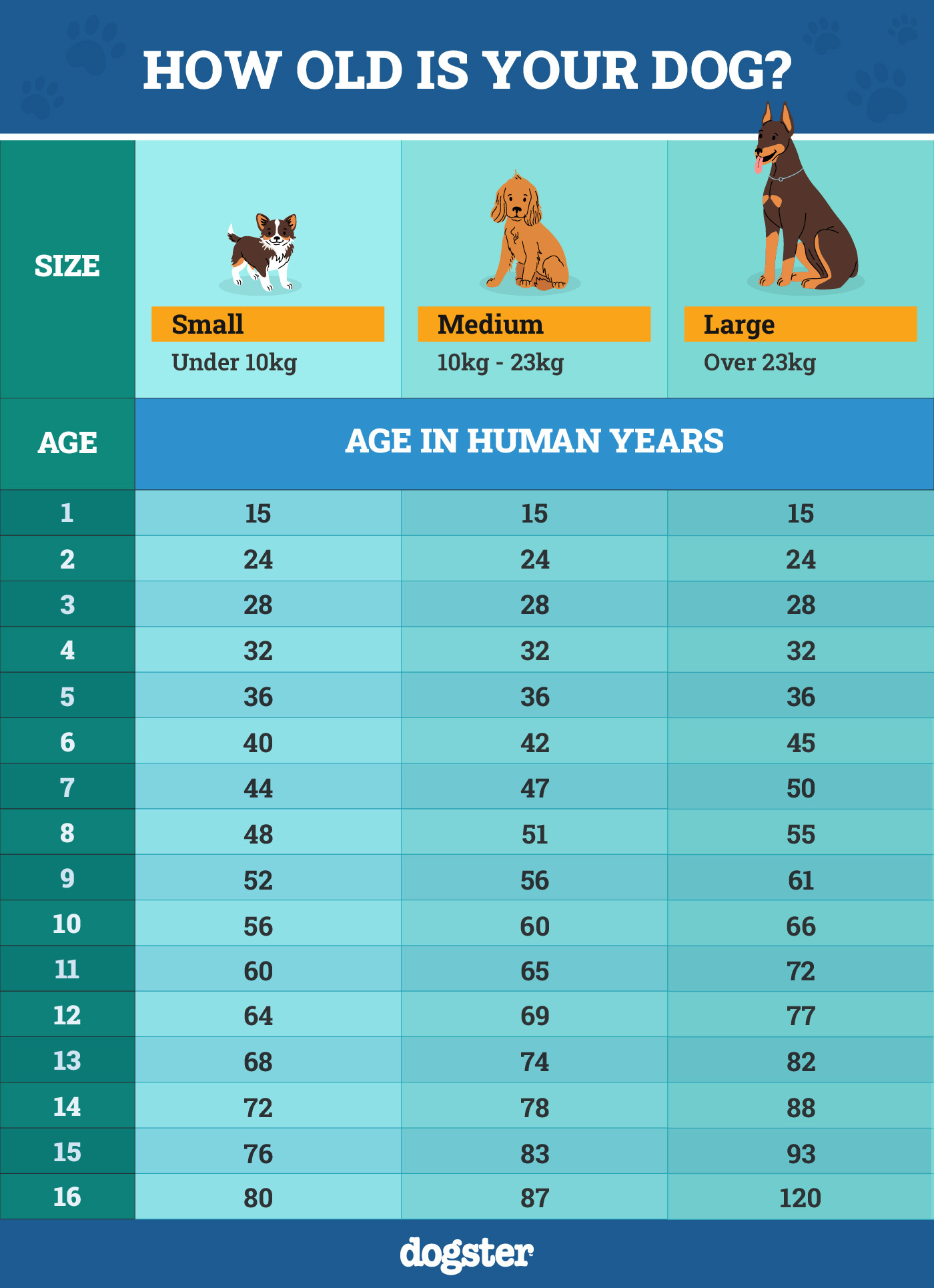In this article
The vast majority of people will equate 1 year of human life to 7 years of life for dogs, but it’s actually a little more complex than that. Other factors like breed and size affect a dog’s lifespan, and a 9-year-old dog can be between 52 and 71 years old depending on their size.
| Size: | Age in human years: |
| Small breed (<20 lbs or less): | 52 years |
| Medium breed (21 to 50 lbs): | 56 years |
| Large breed (51 to 100 lbs): | 61 years |
| Giant breed (100+ lbs): | 71 years |
Source: Almanac.com

How to Calculate Dog Years to Human Years
Calculating dog years to human years isn’t as simple as multiplying 7 years to every 1 human year. This is because different factors affect how dogs age, such as the dog’s breed, size, and lifestyle.
According to the American Veterinary Medical Association (AVMA), the process of finding an accurate comparison of dog years to human years must include more considerations. Most dogs will reach the equivalent of a 15-year-old human by their first year of life. After they reach 2 years old, dogs will gain roughly 9 additional human years, making them about 24 years old in human years. After that, every human year will equal about 5 years for small to large dogs, more for giant breeds. The larger the dog, the more quickly those years will accumulate.1
It’s also worth noting that ongoing research is looking into the correlation between a dog’s size and weight and their longevity. Smaller dogs tend to have longer lifespans than larger dogs, but more research is needed to locate the actual cause that influences different lifespans between them.

What’s the Science Behind Dog vs. Human Years?
While it’s regarded as common knowledge that 1 human year equals 7 dog years, there’s actually no concrete scientific research that supports this belief. It’s most likely that this belief stems from comparing the human average lifespan of 70 years with the canine average life span of 10 years. However, with the changes in average lifespans in both humans and dogs, it’s safe to say that the 7:1 ratio is a huge generalization.
Ongoing research is aimed towards understanding why there are significant differences in the lifespans of small and large dogs. One research study from the University of Gottingen in Germany has found that every increase of 4.4 pounds in a dog will reduce their life expectancy by 1 month.2
The Dog Aging Project was established to study aging in dogs and find ways to promote healthy aging. It currently has ongoing studies that research how biological and environmental factors affect a dog’s lifespan.3
The Life Stages of a Dog
While we may not know the exact age of our dog in human years, we can still know how to take good care of them when we understand a dog’s life stages. Dogs generally go through six life stages:
- Puppyhood
- Young adult
- Adult
- Mature adult
- Senior
- Geriatric
Puppyhood generally lasts for 6 months to 2 years, depending on the breed of the dog. Larger breeds tend to mature a little slower and may take 2 years to reach young adulthood. The care for puppies heavily focuses on healthy growth and development. Puppies must have their specific nutritional needs met consistently to prevent malnutrition and health complications. They also require healthy amounts of physical exercise, socialization, and mental stimulation.
Dogs enter into young adulthood as they transition from puppyhood to adulthood. Dogs are usually around 6 to 18 months old at this life stage. They reach sexual maturity, but they’re not fully adults yet and may continue to experience growth and developmental changes.
Dogs spend a significant amount of their lives in adulthood, which can begin between the first and second years of their life. They start to become middle-aged at around 5 to 7 years old. Again, the number of years will depend on your dog’s size and breed.
Dogs are considered to be senior dogs when they reach the last quarter of their life expectancy. They remain in seniorhood until they surpass their average life span. After that, they’re regarded as geriatric dogs.

Life Span by Breed Size
| Size: | Average life span: |
| Small breed (<20 lbs or less): | 10–15 years |
| Medium breed (21 to 50 lbs): | 10–13 years |
| Large breed (51 to 100 lbs): | 8–12 years |
| Giant breed (100+ lbs): | 8–10 years |
Source: American Kennel Club

Key Factors That Affect the Dog’s Aging Process
As we’ve mentioned before, a dog’s aging process is affected by their size and breed. Purebred dogs have more well-documented life expectancies than mixed-breed dogs, and smaller dogs have longer average lifespans than bigger dogs.
A dog’s breed also affects their lifespan because different purebred dogs are predisposed to specific health issues. Some of these health issues can be serious and life-threatening. For example, Golden Retrievers and German Shepherds are at higher risk of developing cancer as they age.
While genetics play a role in a dog’s life expectancy, lifestyle also affects healthy aging. Dogs that eat a nutritious diet and get appropriate amounts of exercise and mental stimulation are less likely to get sick and develop chronic health issues like diabetes. Dogs that live in stable and happy homes also tend to experience less stress, and caring for a dog’s mental and emotional well-being also promotes healthy aging.


Conclusion
If you’re interested in calculating your dog’s age in human years, it’s best to consider your dog’s age and breed rather than just multiplying their years of life by 7. Having an accurate estimate of your dog’s age can help immensely when caring for your dog. You’ll feel more prepared with providing age-related care for each life stage and know what health concerns to look out for as your dog ages.
You might also be interested in:
- How Old Is 1 in Dog Years? Vet-Approved Guide to Each Size of Dog
- How Old Is 2 In Dog Years? Vet-Approved Guide to Each Size of Dog
Featured Image Credit: Freyant, Shutterstock


















